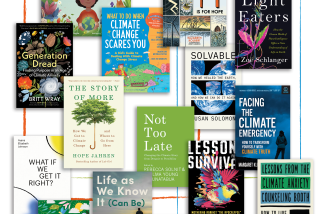Donella Meadows; Co-Wrote Book on Global Environmental Collapse
- Share via
Donella Meadows, who co-wrote a 1972 bestseller that predicted global ecological collapse and galvanized the neophyte environmental movement, has died at the age of 59.
An author and adjunct professor at Dartmouth College, Meadows spent 30 years crusading for sustainable use of the Earth’s resources. She died Tuesday at Dartmouth-Hitchcock Medical Center in Hanover, N.H., after a two-week hospitalization for bacterial meningitis.
Environmentalists called Meadows a visionary who was able to foresee the risks of a boundless population and appetite for energy.
Meadows was the principal author of “The Limits to Growth,” in which she and other Massachusetts Institute of Technology scientists used computer modeling to predict what would happen to the Earth in the 21st century if trends in population, fuel use, food production and pollution continued. Many dire predictions failed to materialize, but experts say that is the result, in part, of the world’s heeding the warnings in the landmark book, which sold 9 million copies.
“She was one of the provocative and original thinkers, and yet she was always willing to change her mind, which great thinkers are not always willing to do,” said Carl Pope, executive director of the Sierra Club.
Despite her doomsday predictions, Meadows was an optimist who refused in her writings to see people as fatally flawed or the Earth as doomed. And despite her idealism, she also was a realist. In recent years Meadows had moderated what she called her “holy war,” acknowledging that a revolution in the way people treat the environment will take centuries and require enormous sacrifices.
“We humans, even at our collective worst or best, are nowhere near powerful enough to destroy a whole planet or to save it,” she wrote in 1990.
The 1972 book, written with then-husband Dennis L. Meadows and Jorgen Randers, created a sensation by advocating “deliberate checks” on economic and population growth. The predictions spurred heated debate.
On the book’s 20th anniversary, Meadows discussed the predictions, saying many had come true, but in different degrees. The book projected, for example, that oil supplies would run out within 100 years.
“We underestimated the amount of energy efficiency that the world would adopt over 20 years. That was a good thing that happened,” Meadows said in 1992.
Population also didn’t grow as rapidly as the authors projected. Instead of doubling to 7 billion by 2000, as the authors predicted, worldwide population reached 6 billion.
Born in Elgin, Ill., Meadows earned a bachelor’s degree in chemistry from Carleton College in Minnesota and a doctorate in biophysics from Harvard. She had been a professor at Dartmouth since 1972.
She received a $320,000 “genius grant” from the MacArthur Foundation, as well as a grant from the Pew Foundation. She wrote nine other books, including a 20-year update of “The Limits to Growth,” and a syndicated newspaper column, “The Global Citizen.”
She tried to heed her own warnings. She lived for 27 years on an organic farm in New Hampshire and in 1999 helped found the Cobb Hill “eco-village” in Vermont.
But in recent years she realized the hypocrisy--even humor--of trying to live in modern society without leaving a scar on the planet.
“For a while, I was a self-righteous eco-snob, the kind that gives rise to the stereotype,” she said in a 1999 opinion piece for The Times. “I banished synthetics and went around in wrinkled cotton clothes. I pointedly passed up the meat at dinner parties. I wasn’t kind to people with more than two children. If you know folks like that, have patience with them. They won’t be able to keep it up very long.”
Meadows wrote that she realized “there’s no way to live an ecologically pure life in an industrial society. Compromises are inevitable. My own contradictions are blatant.”
She wrote in 1999 that her new mission was to launch an “honest experiment” to be Earth-friendly, with room for mistakes and contradictions. “Once I forgave myself,” she wrote, “I could forgive the rest of the human race.”
Meadows is survived by her mother, Phebe Quist, of Tahlequah, Okla.; her father, Don Hager of Palatine, Ill.; and a brother, Jason Hager of Waterford, Wis.
*
Times staff writer Gary Polakovic contributed to this story.






